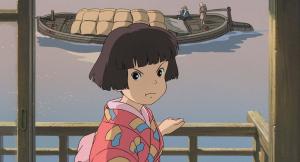Go (re-) watch Kurenai no Buta (Porco Rosso) instead.
Shortest review in history! *Cue applause*
What’s that? You want some real criticsm? Fine.
Look, I was really excited for “Kaze Tachinu,” and I’ve been looking forward to seeing it ever since it was announced. I’m a big Studio Ghibli fan. I’ve seen all the films, and I bought Ni no Kuni as soon as it came out in North America (review to come!). But I’m the first to acknowledge that the quality of their output is distinctly uneven, ranging from utterly brilliant to merely passably entertaining. Kaze Tachinu, unfortunately, belongs to the latter category.
And I’m not just saying this because, as a “real world” Ghibli film, I am somehow disappointed by the relative lack of fantastical elements as compared to Miyazaki’s other output. Hell, my very favourite Ghibli movie is “Porco Rosso,” which is for the most part just as grounded in reality (well, except for the giant pig) as “The Wind Rises.” And perhaps that’s why I found this latest contribution so disappointing: compared to “Porco Rosso,” “Kaze Tachinu” suffers terribly from its lack of narrative integrity, low stakes, and essentially colourless main cast.
What can we say about the film’s depiction of Jiro Horikoshi, after all, except that he is an impossibly polite, generous, diligent, brave, self-effacing and otherwise generally upstanding young man whose only character flaw appears to be bad eyesight? Well, that and paedophilia if he really did fall in love with Naoko at first sight.
And speaking of Naoko, could Miyazaki possibly have come up with a more one-dimensional female lead? All she appears to be around to do is exist as an object for Jiro’s affection and then go on look pretty as she wastes away from tuberculosis. What happened to Miyazaki’s usual efforts to include female characters who are strong and interesting in their own right? Why couldn’t we learn more about Jiro’s sister’s struggles to become a doctor in super-patriarchal Imperial Japan? Now that’s a movie I’d like to see.
But then again, just like Naoko and her illness, Kayo and her determination to become a doctor are pure fiction, presumably inserted into Jiro’s rather unremarkable personal life in order to give the audience something to care about. This is because Jiro’s all-consuming passion for aeronautical engineering more or less stops being a sufficiently compelling vehicle for plot advancement around the time he actually becomes an aeronautical engineer.
Which leads me to the question: why choose Tatsuo Hori’s short story about a consumptive girl in a sanatorium for this purpose? Is it even possible to pick a tropier trope? At least Violetta had an interesting backstory. If Miyazaki thought Jiro’s personal life was not interesting enough for a straight biopic, why not at least go with something more daring–or at the very least more exciting?
How about explaining why Jiro had to hide from the secret police? Talk about wasted narrative potential! Surely that would have been a more rewarding cinematic experience than watching a sickly-but-resolute Naoko picking Jiro’s dirty clothes up off the floor to fold them after he gets home from a long day at the office.
I am not kidding. That is a thing that actually happens in the movie.
It is at least vaguely insinuated that Jiro’s trouble with the secret police relates to the couple’s interactions with “Mr Castorp,” a mysterious German friend the couple makes during their courtship at a country inn. Since “Catsorp” is a pseudonym borrowed from the hero of Thomas Mann’s “Der Zauberberg” (a reference repeatedly made within the film), it seems likely that “Castorp” was some kind of spy or dissident who came to be on the regime’s hit list and Jiro was under suspicion due to their association at the inn. At least let’s hope that’s it. Some reviews have suggested he is meant to be read as Jewish–but given his, er, odd physiognomy let’s just hope that it’s plain old European stereotyping rather than anything more problematic.
So, what’s the take-away here? Is Kaze Tachinu worth a watch? Let’s check the Pros and Cons:
Pro
Visually stunning
Some aeroplane porn
Taisho nostalgia
Japanese resilience in the face of disaster
Con
Stale plot
Not enough aeroplane porn
Shallow characterization
Vaguely racist
Dodges Jiro’s moral responsibility in working
for the Imperial war machine
Fails the Bechdel Test
Total lack of Sky Pirates
Final verdict? I wish he’d made the movie about Caproni instead. Thank goodness there’s still Porco Rosso.





